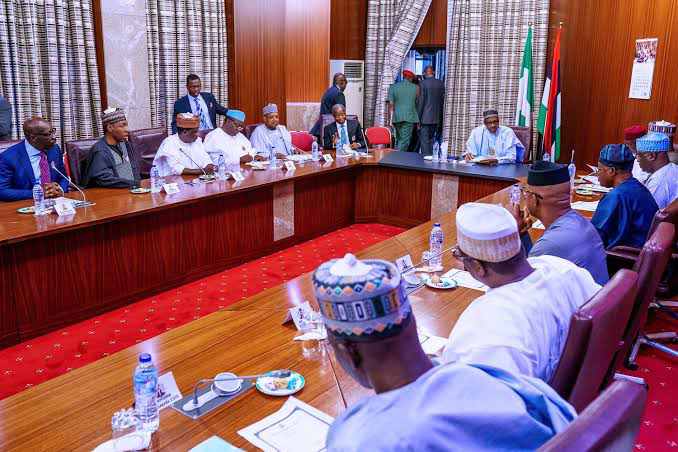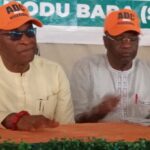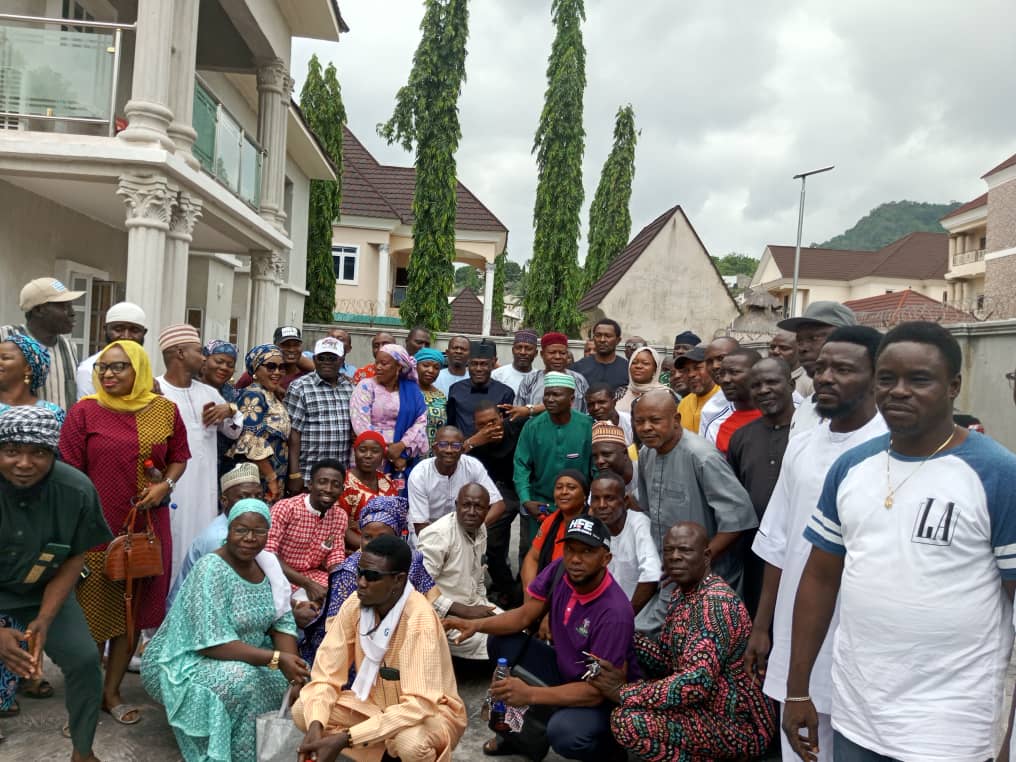
By News Desk
Ahead of February/March Elections and three months to the end of president Muhammadu Buhari’s tenure, the President has come face to face with the reality of transiency of power, as governors of his party, the All Progressives Congress (APC), who once held him up, almost as a deity, who could do no wrong, have effectively started a rebellion against him over the currency redesign policy of the Central Bank of Nigeria (CBN), in an apparent choice between the old regime and new or future.
It is few days to the February 25, 2023 presidential and national assembly elections, and a few more to the March 11 governorship and state assembly polls, and Buhari, who is running out of time, appear determined to leave credible elections as positive legacy. But his effort appears to have run into troubled waters, with governors of his party up in arms against him; an indication that the ruling party has become a house divided against itself.
“It is easy to tell that the APC as a party is troubled. There are different forces pulling in different directions,” noted Anthony Chidi, an Abuja based lawyer and political analyst.
“The people behind Buhari clearly do not want Tinubu. Remember that they wanted Ahmad Lawan as candidate as even El-Rufai disclosed recently. The governors on their part know that their political future is tied to that of Tinubu. So, they are out to do whatever it takes, including fighting Buhari, who is on his way out.”
Buhari had given his word about his determination to ensure credible polls on more than a few occasions, and despite joining the campaign train of Bola Tinubu, the party’s presidential candidate, and asking his supporters to vote for the former Lagos governor, he appears to be in no mood to go beyond this. “Nigerians,” he said in a recent interview, “should vote for whoever they want to be their next president.”
But while Buhari, 80, may be thinking about retirement after his tenure as president, and, therefore, has little personal interest in the battle for 2023, his party’s governors have ambitions of their own. First time governors like Abdullahi Sule of Nasarawa and Bello Matawalle of Zamfara are seeking second terms in office, while a number of outgoing governors, in addition to seeking senate seats, want to impose their candidates as successors. And even more importantly, much of their political futures are tied to the party retaining power at the centre.
The new electoral act, which has permitted the use of technology is already ‘bad news’ for those already used to the ‘system,’ and trying to eliminate vote-buying, which the currency redesign policy partly hopes to achieve, could be one move too many.
The potential biggest casualties of the policy would be members of the ruling party, particularly the presidential candidate, Tinubu, a known big spender, who is alleged to have stashed away huge war chest to prosecute the February 25 polls.
Many of the governors, it was gathered, had also stashed huge sums of money in their homes for the election, and while some have been able to swap a handful in connivance with bank officials, Business Hallmark learnt that billions are still waiting to be swapped, while the Economic and Financial Crimes Commission (EFCC), backed by some forces in Aso Rock, is determined to ensure that this does not happen.
“At the moment Bawa (Abdulrasheed Bawa, EFCC chairman), has refused to bulge,” a source familiar with the matter told Business Hallmark. “They have been putting pressure on him, but to no avail. Now they want to try and see if they can get him out. But it’s not possible because he has strong backers.”
On Sunday, Alhaji Buba Galadima, a chieftain of the New Nigeria People’s Party (NNPP) disclosed that a governor in the northwest part of the country has up to N22bn in old currency stashed in his house, and has been unable to swap them for the new notes.
“The government said it is doing this because a lot of people have amassed wealth and stashed away billions in old currency in their homes. Agreed because I know from intelligence that there is a governor in the Northwestern part of the country that stashed about N22bn in his house. He knows himself and the security agencies know,” he said in an interview with Trust TV.
Over the weekend, a number of civil society organisations began protests in Lagos, demanding the resignation of the EFCC boss, over what said is his constant disregard for court orders. But the protests are part of attempts to try to oust him. The initial plan to ease out Godwin Emefiele, governor of the Central Bank of Nigeria, using phantom terror financing allegations in order to stop the naira redesign policy, had hit a brick wall as Buhari stood his ground.
With their backs again the wall therefore, the governors have rallied against the president, who has himself stood his ground, and a battle line appears to have been drawn.
The President’s actions in recent months have spoken louder than his voice. The naira redesign policy, which credible sources in the presidency have told Business Hallmark is his idea, despite efforts by party members to pin same down to his ‘powerful’ personal aide, Sabiu Tunde, and a certain cabal in Aso Rock, including Emefiele, who is being made the scapegoat in some quarters, is to ensure that the money bags intending to buy power with accumulated funds are put in check.
Last week, the opposition Peoples Democratic Party (PDP), which, along with the Labour Party, had expressed tacit support for the policy, in a statement by its national publicity secretary, Debo Ologunagba, said it uncovered a clandestine plot by APC leaders allegedly working for Tinubu to swap N22.5bn stashed old naira notes to new ones in Kano State, in a move to actualize APC vote buying plans in the general elections.
“The PDP has been made aware that the N22.5 billion in old N1000 notes was allegedly kept in a Kano State Government facility before being moved to a particular old generation and a certain new generation bank, where the regional heads were contacted by the APC Presidential Campaign to swap the old notes with new ones,” Ologunagba said in the statement.
“Further information revealed that the cash is being warehoused by the Tinubu Campaign for vote buying in Kano, Kaduna, Bauchi, Jigawa and Sokoto States. A particular APC State governor is reported to have taken delivery of N500 million new Naira notes to actualize the vote buying plot.
“Also, there is intelligence that arrangement has been concluded by APC leaders to move a substantial part of the old naira notes from Kano to Lagos State between today and tomorrow for the purposes of swapping them with new ones.”
Mr. Festus Keyamo, spokesman for the APC presidential campaign council did not respond to an inquiry by Business Hallmark about the validity or otherwise of the allegations.
Regardless, while the currency redesign policy may be well-intended, it has, perhaps on account of sabotage, sloppy implementation created biting scarcity, and compounded the suffering of Nigerians, who were already battling with fuel scarcity and unbearable inflation, and the governors, whose interest may not be beyond winning elections, have found politically correct reason to fight the policy, and by extension, President Buhari.
A fortnight ago, Nasir El-Rufai, governor of Kaduna State, who has been very vocal in his renunciation of the policy, alleged that a fellow governor had collected N500m of the new notes in one day, driven to his house by a bank manager.
“I tell you this change does not affect politicians, they have their money and they are prepared, they know how to access the new notes, it is the poor, who don’t have ways, even yesterday we were told one of the governors was given N500m of the new notes,” the Kaduna governor said in an interview with BBC Hausa.
El-Rufai maintained that it is not wrong to change currencies as every country does, but that it is wrong to do so this season of elections and give this limited time.
The Kaduna governor, who largely instigated what has become a united front of APC governors against Buhari over the policy, had earlier on February 1, alleged that some people hiding behind Buhari are working against the success of Tinubu at the presidential poll, but failed to name those involved.
Battle Line Drawn
On Friday, February 3, ahead of the February 10 new deadline for phasing out old naira notes, El-Rufai, and other APC governors, stormed Aso Rock to meet the president. Speaking after the meeting, Abdullahi Ganduje, governor of Kano State, said they pleaded with Buhari to allow both the old and new naira notes to co-circulate to ease the suffering of Nigerians.
Ganduje said the President promised to look into the situation, but Business Hallmark gathered that their request was rejected.
“I can tell you that the President didn’t agree to the request for extension by the governors,” an insider source, who craved anonymity told Business Hallmark. “They (the governors) left disappointed. That’s what happened.”
The Presidency subsequently issued a statement stating that President Buhari had asked Nigerians to give him seven days to look into the complaints about the scarcity with a view to finding solutions; a statement that practically said nothing of substance.
Agitated, the governors opted for the court. On the same day, February 3, those of Kaduna, Kogi and Zamfara states dragged Buhari’s government to the Supreme Court and sought a restraining order to stop the full implementation of the naira redesign policy.
In a motion ex-parte filed before the apex court, the three states are praying the court to grant an interim injunction stopping the CBN from ending the timeframe within which the old N200, N500, and N1000 notes will cease to be legal tender.
The plaintiffs argued since the announcement of the policy, there has been an acute shortage in the supply of the new naira notes in their states, adding that citizens, who have dutifully deposited their old currency notes have increasingly found it difficult and sometimes next to impossible to access the new notes for their daily activities. They submitted that the 10-day extension is insufficient to address the challenges plaguing the policy.
They sought a declaration that the demonetisation policy of the CBN is not in compliance with the extant provisions of the constitution, and the Central Bank of Nigeria Act, 2007, and a declaration that the three months notice given by the federal government through the CBN is in gross violation of the provisions of Section 20(3) of the CBN Act, which specifies that reasonable notice must be given.
On Wednesday, a seven-man panel of the Supreme Court restrained the Federal Government from implementing the February 10 deadline.
The panel led by Justice John Okoro, in a unanimous ruling, which has since become contentious, given that currency management is in the exclusive list, granted an interim injunction restraining the FG, CBN and commercial banks from implementing the February 10, deadline for the old 200, 500 and 1000 Naira notes to stop being a legal tender.
The court further held that the FG, CBN, commercial banks must not continue with the deadline pending the determination of a notice in respect of the issue on February 15.
Reacting to the judgement on Thursday, Abubakar Malami, the attorney general of the federation and minister of justice, who disagreed with the decision, nonetheless, noted that the federal government will obey the ruling.
Malami, however, said the government was hopeful that the exparte ruling, which expires on Wednesday, February 15, 2023, would be upturned.
In the meantime, the CBN has yet to issue a circular to banks on whether or not to accept deposits in old notes, which has caused confusion, with several banks already rejecting the notes.
More States Join Fray
In the meantime, ahead of the February 15 date for the determination of the notice, three other APC states, Ondo, Kano and Niger have filed suits against Buhari’s government at the apex court, in what is becoming a battle between the Tinubu camp and the Buhari led federal government.
On Thursday evening, the Ganduje government of Kano filed the suit number: SC/CS/200/2023, by the Attorney General, through his Counsel, Sunusi Musa, SAN, asking the apex court to declare that President Buhari cannot unilaterally direct the CBN to recall the now-old N200, N500 and N1,000 banknotes without recourse to the Federal Executive Council and National Economic Council, respectively.
The Kano government is praying a mandatory order seeking a reversal of the Federal Government policy to recall the N200, N500 and N1,000 notes from circulation due to the policy affecting the economic well-being of over 20 million Kano citizens.
The applicant is also seeking for mandatory order, compelling the federal government to reverse the naira redesign policy for alleged failure to comply with 1999 Constitution (as amended).
The applicant is similarly praying for mandatory seeking the apex court to compel the Federal Government to reverse the cash swap policy for allegedly not complying with the 1999 constitution and other extant legislation.
“A Declaration that the combined reading of the provisions of the section 148(2) of 1999 constitution and Part 1, and Paragraph 19 of the Third Schedule thereof, the President cannot unilaterally without recourse to the Federal Executive Council and National Economic Council respectively give approval to the Central Bank of Nigeria for the implementation of cash withdrawal limit pursuant to the demonetization economic policy of the Federal Government of Nigeria,” the suit read.
On its part, the Ondo government in an originating summon filed and signed by the state attorney general, Charles Titiloye, is asking the Supreme Court to stop the implementation of the directive issued by the federal government through the apex bank on limitation of daily cash withdrawals from banks. The suit noted that the policy has paralysed economic activities in the state.
The state noted that the policy is an infraction on the legal rights of the Ondo State Government and its citizens to access funds for the execution of developmental projects, and small credit facilities to petty traders (who have no bank accounts).
The applicant urged the Supreme Court to declare that the Buhari government cannot issue a directive through the apex bank seeking to amend or vary an existing Act of the National Assembly “particularly Section 2 of the Money Laundering Act, which relates specifically to limitations on cash withdrawals for individual and Corporate organization to Five (5) million Naira and Ten (10) million Naira respectively”.
Still, the Niger State government said on Thursday that it filed a lawsuit against the federal government over the naira redesign policy at the Supreme Court. A statement by Justice Nasara Danmallam, the Attorney General and Commissioner for Justice, in Minna on Saturday, said the case was filed with suit number SC/CV/210/2023.
Meanwhile, Rivers State Governor, Nyesom Wike, who on Wednesday, commended the Supreme Court for “saving Nigerians and democracy by restraining the Central Bank of Nigeria, CBN, from implementing the February 10 deadline on the phasing out of N200, N500 and N1000 old notes,” said he will join the suit against the Federal Government, noting that the PDP in the state is not in support of the policy.











